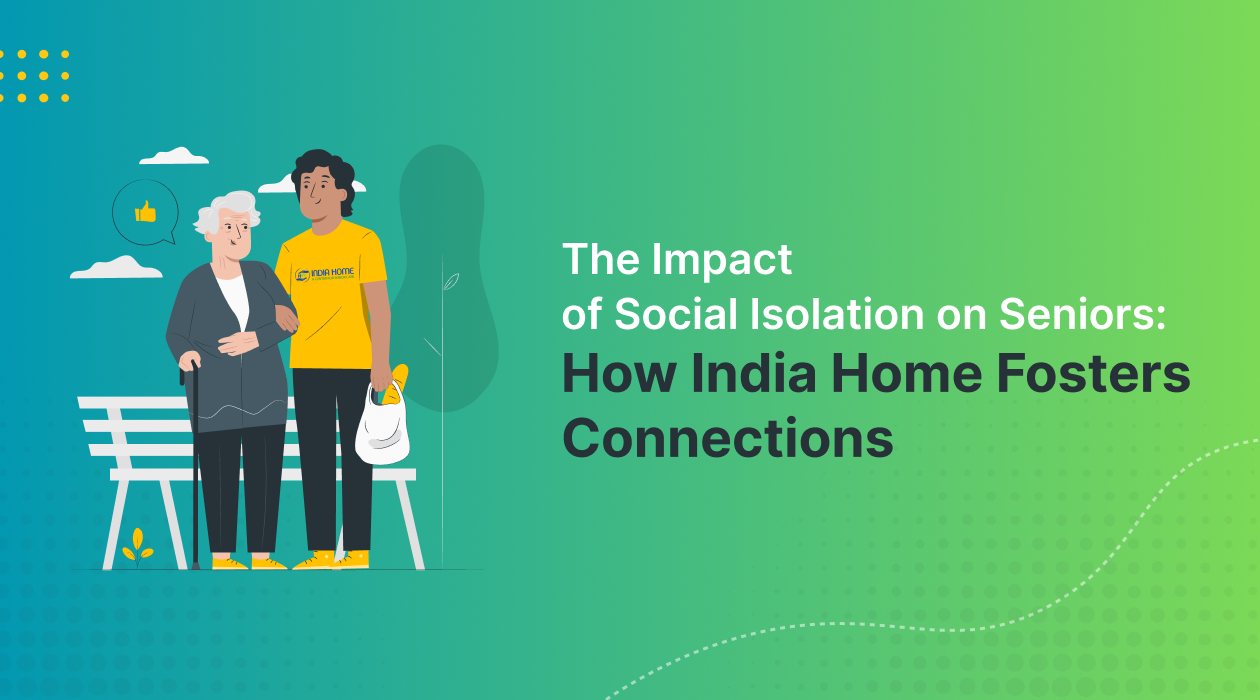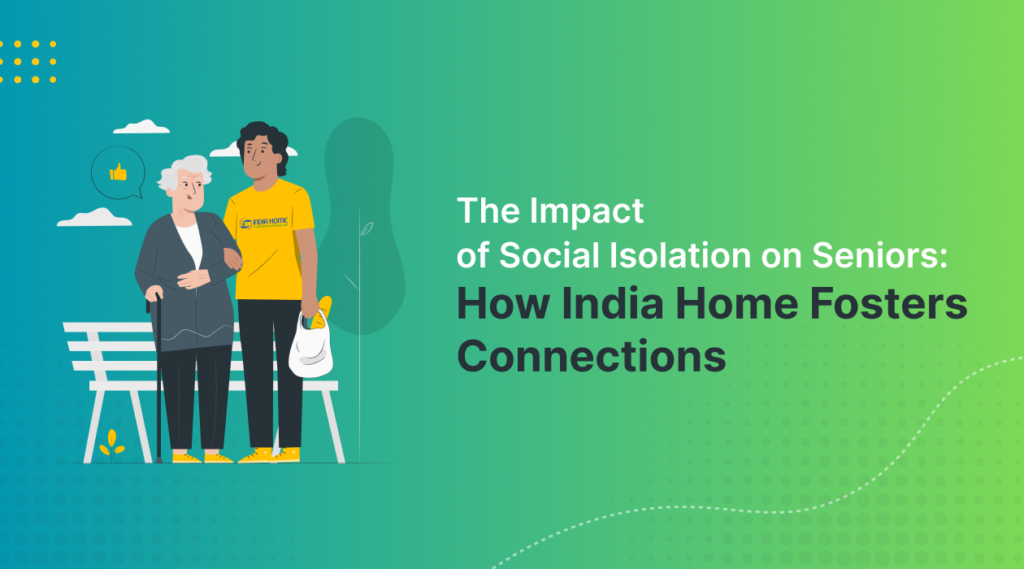

As we navigate the complexities of modern life, it’s easy to overlook a pressing concern affecting a growing segment of our population: social isolation among seniors. This issue, often hidden in the shadows of our bustling world, has profound implications for the well-being and quality of life of our elderly community members.
Social connections are a fundamental aspect of the human experience, offering companionship, emotional support, a sense of belonging, and opportunities for engagement and fulfillment. For seniors, these connections become even more vital as they provide a lifeline to combat loneliness, depression, and isolation.
Social Isolation Among the Elderly
Social isolation is not merely a state of physical seclusion; it is a complex and multifaceted issue that encompasses a lack of meaningful social interactions and a sense of disconnection from one’s community and loved ones. Among seniors, this isolation can manifest in various ways:
Physical Isolation: This occurs when seniors have limited opportunities to leave their homes due to mobility issues, lack of transportation, or geographic distance from friends and family.
Emotional Isolation: Seniors may experience emotional isolation when they lack close relationships or when their relationships become strained or distant.
Cultural and Linguistic Barriers: In the case of immigrant seniors, language and cultural differences can exacerbate isolation by making it difficult to connect with others who share their background.
Loss of Loved Ones: The passing of friends, spouses, or family members can leave seniors feeling profoundly isolated as they grapple with grief and the absence of their social support network.
Health Challenges: Chronic illness, pain, or cognitive decline can limit seniors’ ability to engage in social activities, leading to isolation.
The Physical and Mental Health Consequences of Social Isolation
The impact of social isolation on seniors extends far beyond feelings of loneliness; it can have severe consequences for their physical and mental well-being:
Physical Health Consequences:
- Declining Health: Seniors who are socially isolated are more likely to experience declining physical health, including weakened immune systems and increased vulnerability to illnesses.
- Cognitive Decline: Research suggests that social isolation can contribute to cognitive decline and a higher risk of conditions like dementia and Alzheimer’s disease.
- Increased Mortality Risk: Studies have linked social isolation to a higher risk of premature death, making it as detrimental to health as smoking or obesity.
Mental Health Consequences:
- Depression and Anxiety: Loneliness and isolation are significant risk factors for depression and anxiety among seniors, often exacerbating preexisting mental health conditions.
- Decreased Quality of Life: Isolation can lead to a reduced sense of purpose and overall life satisfaction, further contributing to mental health issues.
- Elevated Stress Levels: Isolated seniors may experience higher stress levels, which can harm their physical health.
The South Asian Senior Community
According to a 2021 study, approximately one-third of South Asian elderly in the US (29.9%) admitted to occasional feelings of loneliness, while 39.1% encountered various forms of emotional distress. Within the diverse tapestry of senior populations, South Asian elders face unique challenges that intersect with social isolation. Cultural, linguistic, and generational factors often influence these challenges:
1. Language Barriers: Many South Asian seniors may have limited proficiency in the primary language of their host country, making it difficult to engage in social activities or access healthcare services independently.
2. Cultural Norms: Cultural norms and values within the South Asian community often emphasize respect for elders, making seniors less likely to seek help or openly express their feelings of isolation.
3. Intergenerational Gaps: South Asian families tend to be close-knit, but intergenerational gaps in understanding and lifestyle can sometimes lead to misunderstandings and distance between elders and their children or grandchildren.
4. Immigrant Experience: Seniors who have immigrated to a new country may grapple with nostalgia, loss of familiar social networks, and the challenges of adapting to a different culture.
5. Limited Social Circles: Cultural enclaves can inadvertently limit the social circles of South Asian seniors, as they may primarily interact with individuals from similar backgrounds, potentially hindering opportunities for additional social connections.
Understanding the profound impact of social isolation on seniors is the first step in addressing this critical issue. It highlights the urgency of creating support systems and community resources, like those provided by organizations such as India Home, to combat the daily isolation many seniors face.
Cultural Factors Contributing to Isolation
Several cultural factors within the South Asian community can contribute to social isolation among seniors:
- Collectivist Culture: South Asian cultures often prioritize collectivism, where family and community cohesion are highly valued. While this can provide a robust support system, it can also lead to isolation if seniors feel a burden or are hesitant to express their needs.
- Stigma Around Mental Health: Mental health issues, including loneliness and depression, are often stigmatized within the South Asian community. Seniors may be reluctant to seek help or admit their feelings of isolation due to fear of judgment.
- Traditional Gender Roles: Gender roles can also play a role in isolation, with some South Asian women finding themselves isolated due to conventional roles that may limit their opportunities for social engagement.
Recognizing these unique challenges and cultural factors is essential in addressing the issue of social isolation among South Asian seniors. Organizations like India Home are crucial in bridging these gaps, offering culturally sensitive programs and support that empower South Asian seniors to overcome isolation and forge meaningful community connections.
India Home: Bridging the Gap
India Home stands as a beacon of hope and support for South Asian seniors in the heart of New York City. This remarkable organization is dedicated to addressing the unique challenges faced by elderly individuals within the South Asian community and creating a vibrant, inclusive community where seniors can thrive.
At the core of India Home’s mission is a profound commitment to nurturing the well-being and happiness of South Asian seniors. Their approach is multifaceted, encompassing a range of programs and initiatives designed to combat social isolation and foster a sense of belonging:
Diverse Range of Programs and Activities: India Home understands that seniors are a vibrant and diverse group, each with their interests and needs. As such, they offer a wide array of programs and activities tailored to cater to their senior members’ diverse tastes and preferences. These include educational talks on health, nutrition, financial safeguards, elder law, and enriching outings to museums and parks.
Cultural Celebrations and Festivals: India Home recognizes the importance of cultural connections for seniors. They facilitate celebrations of major cultural festivals, such as Diwali and Eid, allowing seniors to maintain their cultural ties and traditions while enjoying community.
Physical and Mental Well-being: India Home encourages physical and mental well-being through yoga and art classes. These activities promote better physical health and provide opportunities for social interaction and creative expression.
Advocacy and Civic Engagement: India Home empowers seniors to advocate for themselves and their community. They offer opportunities for seniors to engage with local government and support for issues that matter to them, making sure their voices are heard at City Hall.
Embracing Diversity: India Home’s programs embrace the rich tapestry of the South Asian community, from Bollywood dance sessions to traditional folk songs. This inclusive approach ensures that every senior feels welcome and valued regardless of background.
These initiatives combat social isolation and empower South Asian seniors to lead fulfilling, enriching lives. In the following sections, we will explore some of India Home’s specific programs and their impact on the lives of the seniors they serve.
The Significance of Addressing Social Isolation Among Seniors
Social isolation among seniors is not a concern to be taken lightly. It has far-reaching consequences, both in terms of physical health and emotional well-being. From the detrimental effects on cognitive function and increased mortality risk to the profound impact on mental health, it’s clear that combating social isolation is a critical imperative. The need for social connections doesn’t diminish with age; in fact, it becomes even more essential for seniors to maintain a sense of purpose and happiness in their golden years.
Through education, cultural celebration, physical and mental well-being programs, and advocacy, India Home is combating social isolation and enriching seniors’ lives. They provide a lifeline to those who might otherwise feel disconnected from society, empowering them to lead fulfilling lives filled with purpose and joy.

